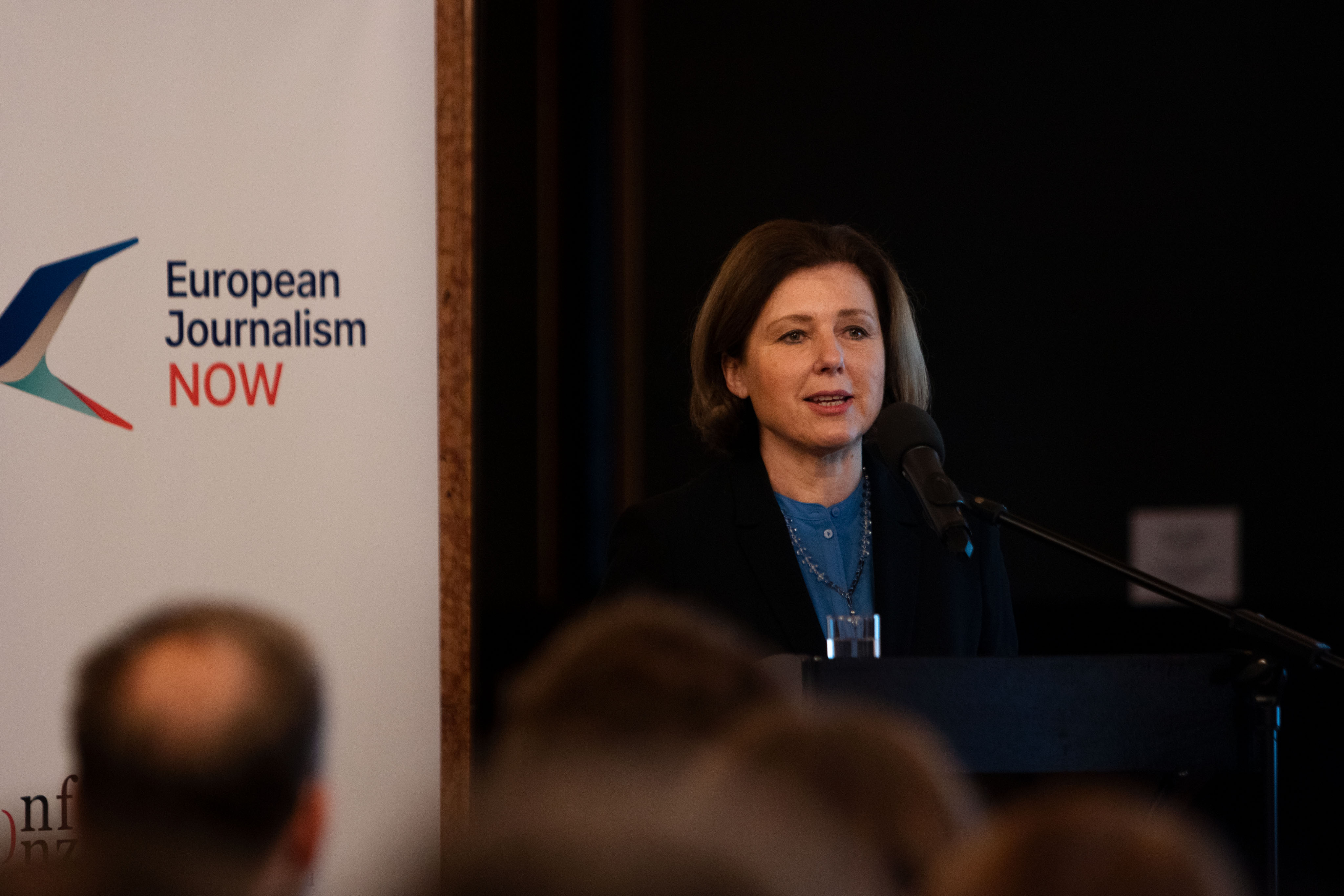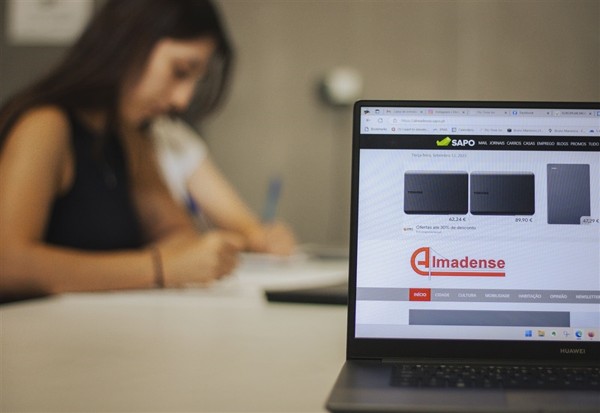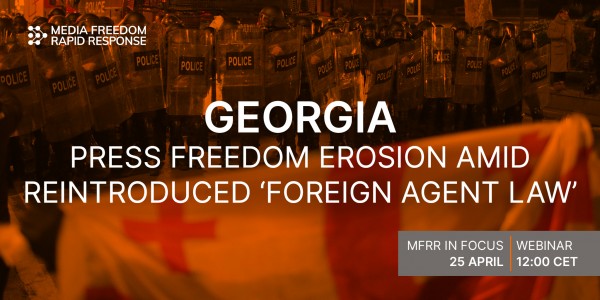The International Press Institute (IPI), together with our Czech National Committee and Endowment Fund for Independent Journalism (NFNZ), held a joint two-day European Journalism Now conference in Prague on December 1–2, focusing on how to evaluate quality journalism, media capture in Central and Eastern Europe, and the European Media Freedom Act (EMFA).
The first day, led by NFNZ, brought together experts from the Media Pluralism Monitor, the Journalism Trust Initiative and the EuroMedia Ownership Monitor to discuss whether a comprehensive framework for media assessment in Europe is possible. The keynote speech was given by NFNZ’s Jiří Kučera.
The second day led by IPI gathered leading editors, journalists, media experts and representatives from media freedom organisations to discuss media capture and the need for a strong European Media Freedom Act (EMFA) to safeguard European democracy.
IPI Executive Director Frane Maroević said at the opening of the session: “IPI together with a group of media organisations welcomes EMFA because it defines and addresses many of the issues that the media is facing today. We all want to work with the EU to make this act stronger, as a tool to guarantee media pluralism, to protect journalists’ rights and to ensure editorial independence”.
The conference on Friday kicked off with keynote speech by European Commission Vice President and Commissioner for Values and Transparency, Věra Jourová.
The EMFA was published by the European Commission in September 2022 and has been welcomed by multiple journalist groups and international and domestic press freedom organisations, including IPI, as a major step forward in shared efforts to strengthen the free and pluralistic media system in the EU.
Commissioner Jourová noted that media in Europe face multiple challenges, ranging from economic pressure to disinformation and decreasing public trust. “What I always say is that legislators shouldn’t work under pressure and shouldn’t be driven by hysteria or fear. But when working on the act I was driven by frustration because we saw many harmful decisions which are narrowing the space for independent media in the EU, especially in Poland and Hungary”, she said.
“What we’re doing with planning the act is regulating the space for media, the environment, the conditions which enable the media to do their job properly”, Jourová continued.
In Prague for the #EuropeanJournalismNow Conference.
Without free media, #democracy is not possible.
Media needs our support in the adaptation to digital reality.
🙏 @EU2022_CZ & all the #MediaFreedom organisations for your strong support for our work, for the #MediaFreedomAct. pic.twitter.com/o4gMziaH4g— Věra Jourová (@VeraJourova) December 2, 2022
Provisions of the EMFA include enhanced media ownership transparency, strict criteria for, and transparency of, the distribution of state advertising funds to media, and enhanced protection against politicised appointments to public service media and a new Europe-wide Board of national regulators to oversee the new rules, among other new rules.
Jourová said that in the past few weeks she has had the opportunity to collect member states’ reactions and opinions to the EMFA by consulting ministers of culture. “The act received very strong support from Bulgaria, Croatia, Slovakia, Slovenia, Greece and Malta. Hungary said it has no legal competence, which was a little bit expected. We got criticism from Germany, Austria and Denmark, mainly for the reason that they felt that they already have a good system in place and don’t want the EU to intervene with that”, Jourová explained.
After her speech, Jourová spent an hour answering questions from the audience, many of which focused on how the law will be enforced. How does it work in practice? Could it backfire in certain countries? To these questions Jourová replied that countries might need an active push from the EU. “We’re not naive about the situation in the member states”, Jourová said.
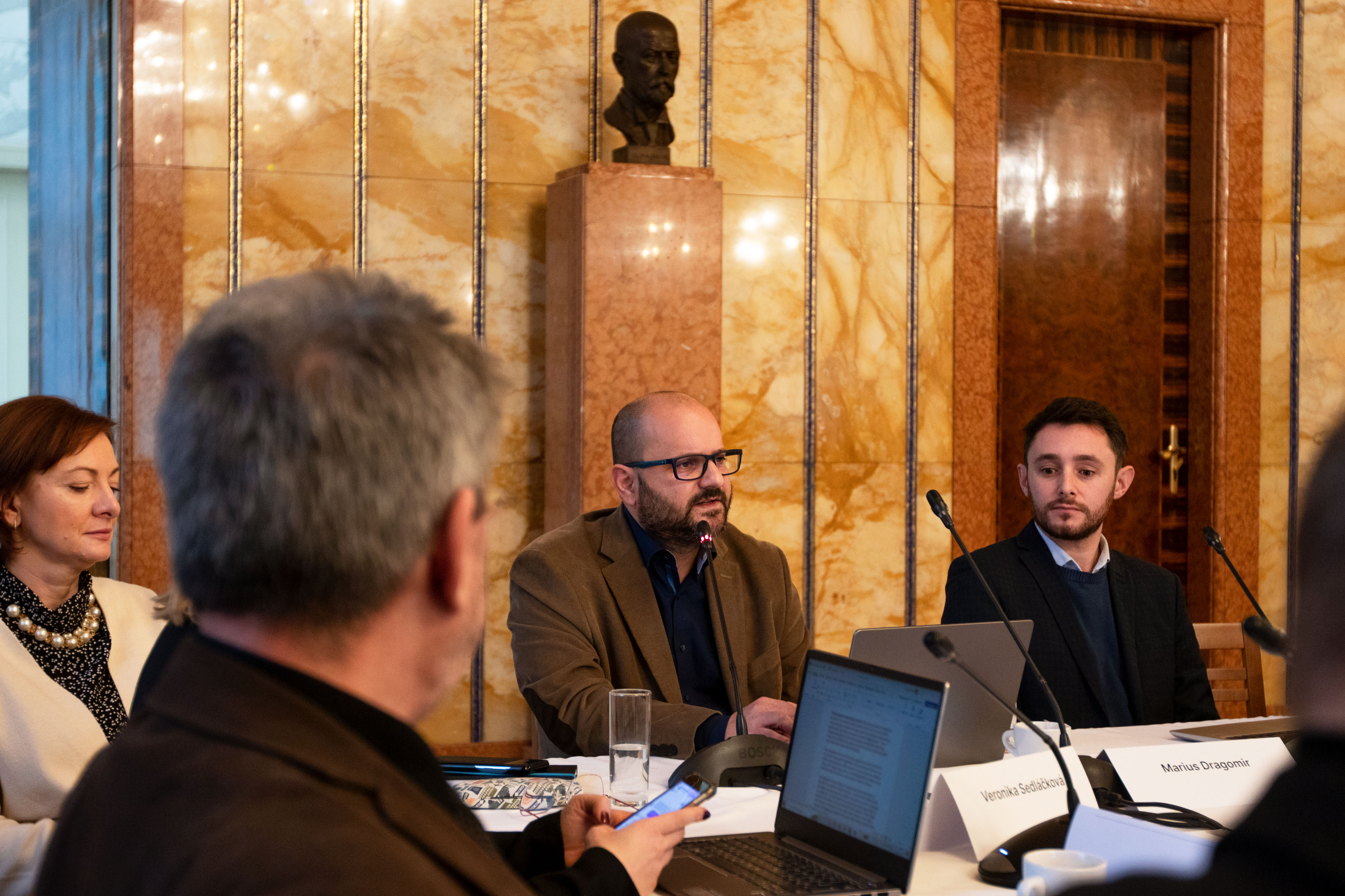
Marius Dragomir (centre), the Founding Director of Media and Journalism Research Center, spoke at the Media Capture roundtable, next to IPI’s Europe Advocacy Officer Jamie Wiseman (right) and the Chair of IPI Czech National Committee, Veronika Sedláčková. Photo: Ronja Koskinen / International Press Institute
Roundtable: Media capture in action
The first roundtable session of the day, titled Media Capture in Action, brought together IPI’s network of leading editors from Central and Eastern Europe including Hungary, Bulgaria, Poland, Slovenia, Slovakia, Greece and the Czech Republic, where media capture is most acute.
The session examined media capture and its impact on free and independent journalism, continuing the conversation from the first day of the conference, where IPI’s panel discussed media freedom in Czech Republic.
Media capture by vested political and business interests for political influence and control is one of the biggest challenges to press freedom across the EU. In Hungary, Poland, Slovenia, Slovakia, Bulgaria and the Czech Republic media capture has squeezed watchdog journalism and eroded media pluralism. During the roundtable, the panellists noted that many of the countries face similar challenges and threats regarding media capture.
“Media capture has a long lasting effect on journalistic values, manipulating audiences preferences. Capture is reinventing the whole media ecosystem”, noted media scholar and journalist Marius Dragomir, who is also the founding director of the Media and Journalism Research Center.
In many countries, illiberal governments have abused state economic and regulatory powers to gain control over public service media, media regulators, state-controlled companies, advertising agencies, competition watchdogs and even the courts, he said. One of these countries is Hungary.
“Hungary is the picture boy for all European media concerns”, Veronika Munk, the head of content at Hungarian independent media outlet Telex said. “The market is heavily influenced by politics and the government media receive a lot of advertising. It all goes back to media structure, how media is connected to politicians”.
IPI and its Executive Board conducted a press freedom mission to Hungary in February 2022. In the report published after the mission, IPI noted that to achieve an unprecedented level of political control over the country’s media ecosystem, the ruling party Fidesz has pursued the most advanced model of media capture ever developed within the EU.
During the roundtable discussions, Beata Balogová, the editor-in-chief of the Slovak daily newspaper SME, noted that the media situation in Hungary is spreading across country borders, affecting Slovakia as well. However, there’s still hope, Balogová noted. “The Slovak media still has a voice. When they point out something, it’ll have an effect on society.”
Michal Klíma, advisor on media freedom and disinformation to the government of the Czech Republic, Veronika Sedláčková, the chair of IPI Czech National Committee, Marton Gergély, the editor-in-chief of HVG in Hungary, Piotr Stasinski, the deputy editor-in-chief from Gazeta Wyborcza in Poland, Velislava Popova, editor of Dnevnik in Bulgaria and journalist Boryana Dzhambazova from Bulgaria, also contributed to the session on media capture.
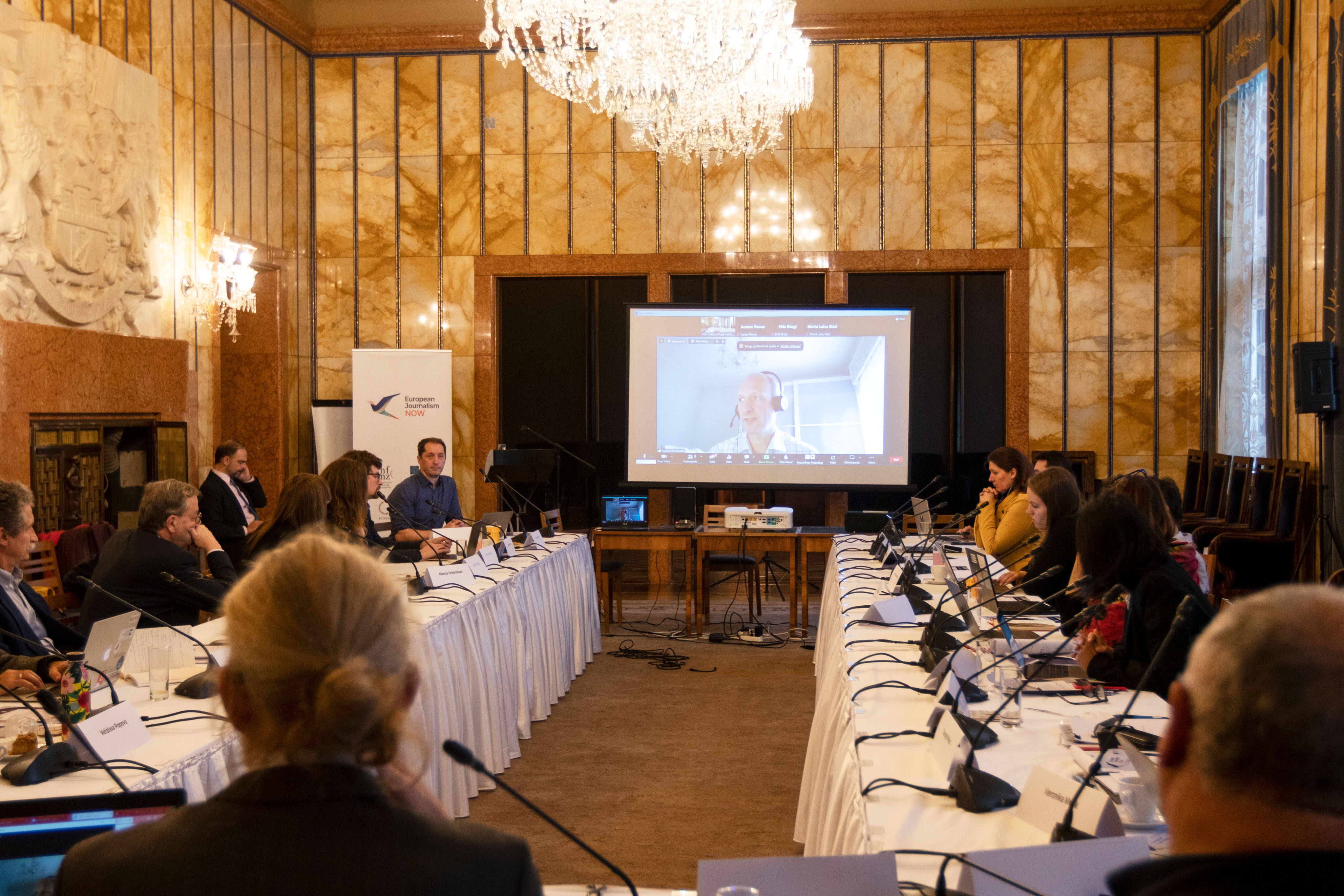
The final session of the conference analysed the EMFA in depth. Some panellists joined the roundtable online, including Audrius Perkauskas, the Deputy Head of Unit of Audiovisual and Media Policy, European commission. Photo: Ronja Koskinen / International Press Institute
EMFA: Strong enough to address media capture?
The second and final session of the day brought the attention back to the European Media Freedom Act. The aim of the session was to bring together media experts, publishers and press freedom groups to review the EMFA and assess whether, in its current form, it can combat media capture and identify the improvements that need to be made to achieve its ambitions.
The panellists agreed that the EMFA is a step in the right direction and a good start. However, one of the repeated concerns that the panellists noted was how the law is going to work in practice.
Renate Schroeder, the director of the European Federation of Journalists noted that the act could end up being soft law without having the intended and needed effect. “For example what happens in Hungary, we can’t solve with this act”, she said.
The panellists agreed that the EMFA still needs more work to improve. It was agreed that the legislation lacks concrete measures on how it’s going to practically address media capture. Where transparency is welcomed, it is only one step in the right direction.
Aurore Raoux, the EU policy manager from News Media Europe noted that there are different interpretations of the act as everyone understands it with their own national perspective.
Maria Luisa Stasi, the Head of Law and Policy for Digital Markets from ARTICLE 19 expressed concern over possible politicising of the proposed media board. “It could easily turn out thatboard members say one thing to Brussels and then abuse media freedom in their own country”.
The experts agreed that strengthening the EMFA must involve efforts to increase the transparency in media ownership with clear rules instead of soft-law recommendations; rules governing all financial relations between the state and media, and guaranteeing the independence of national regulators as well as the independence of the European Board for Media Services.
The conversation was also contributed to by Audrius Perkauskas, the Deputy Head of Unit, Audiovisual and Media Policy at the European Commission, Eva Simon, Advocacy Officer at human rights organisation Liberties, Elda Brogi, a professor from the European University Institute and Lucie Sykorova from Czech Association of Online Publishers.
Experts concluded that, while in many aspects the EMFA in its current form represented a landmark initiative to safeguard media freedom and pluralism in the EU, its enforceability remains the major question for whether it can help unwind media capture in illiberal states such as Hungary and Poland.
The conference was held under the auspices of the Czech government as part of its Presidency of the Council of the European Union and the City of Prague who provided the Mayor’s Residence as the venue. It was supported by the European Commission’s Media Freedom Rapid Response (MFRR) programme and the Friedrich Naumann Stiftung (FNF).
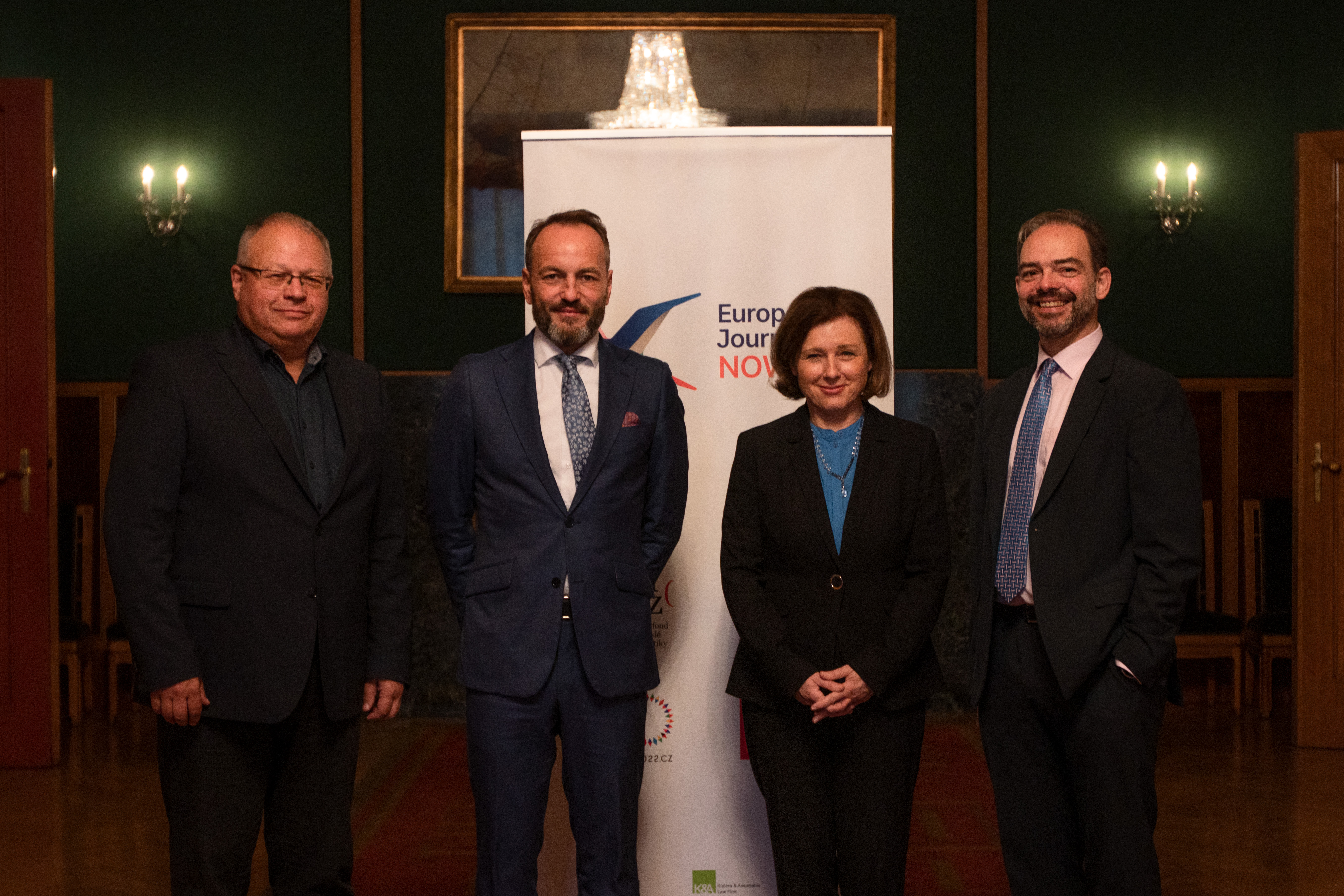
(L-R) Michal Klíma, advisor on media freedom and disinformation for Czech government, Jiří Kučera, Executive Director of NFNZ, Vera Jourova, European Commission Vice President and Commissioner for Values and Transparency and IPI Executive Director Frane Maroević
This event organised jointly by IPI is part of the Media Freedom Rapid Response (MFRR), a Europe-wide mechanism which tracks, monitors and responds to violations of press and media freedom in EU Member States, Candidate Countries, and Ukraine. The project is co-funded by the European Commission.


